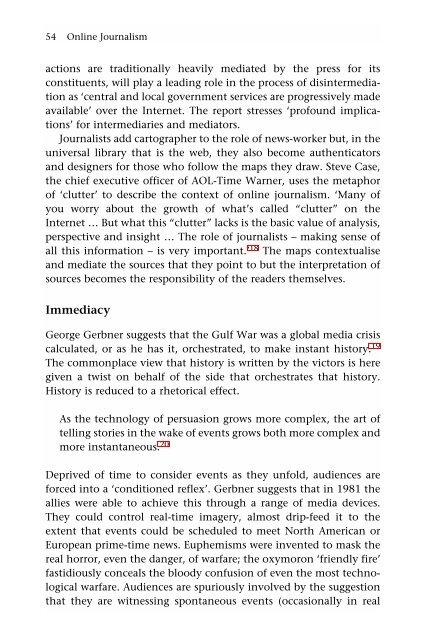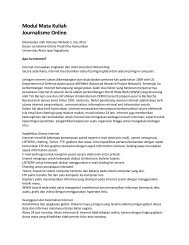Online Journalism - Ayo Menulis FISIP UAJY
Online Journalism - Ayo Menulis FISIP UAJY
Online Journalism - Ayo Menulis FISIP UAJY
You also want an ePaper? Increase the reach of your titles
YUMPU automatically turns print PDFs into web optimized ePapers that Google loves.
54 <strong>Online</strong> <strong>Journalism</strong><br />
actions are traditionally heavily mediated by the press for its<br />
constituents, will play a leading role in the process of disintermediation<br />
as ‘central and local government services are progressively made<br />
available’ over the Internet. The report stresses ‘profound implications’<br />
for intermediaries and mediators.<br />
Journalists add cartographer to the role of news-worker but, in the<br />
universal library that is the web, they also become authenticators<br />
and designers for those who follow the maps they draw. Steve Case,<br />
the chief executive officer of AOL-Time Warner, uses the metaphor<br />
of ‘clutter’ to describe the context of online journalism. ‘Many of<br />
you worry about the growth of what’s called “clutter” on the<br />
Internet … But what this “clutter” lacks is the basic value of analysis,<br />
perspective and insight … The role of journalists – making sense of<br />
all this information – is very important.’ 18 The maps contextualise<br />
and mediate the sources that they point to but the interpretation of<br />
sources becomes the responsibility of the readers themselves.<br />
Immediacy<br />
George Gerbner suggests that the Gulf War was a global media crisis<br />
calculated, or as he has it, orchestrated, to make instant history. 19<br />
The commonplace view that history is written by the victors is here<br />
given a twist on behalf of the side that orchestrates that history.<br />
History is reduced to a rhetorical effect.<br />
As the technology of persuasion grows more complex, the art of<br />
telling stories in the wake of events grows both more complex and<br />
more instantaneous. 20<br />
Deprived of time to consider events as they unfold, audiences are<br />
forced into a ‘conditioned reflex’. Gerbner suggests that in 1981 the<br />
allies were able to achieve this through a range of media devices.<br />
They could control real-time imagery, almost drip-feed it to the<br />
extent that events could be scheduled to meet North American or<br />
European prime-time news. Euphemisms were invented to mask the<br />
real horror, even the danger, of warfare; the oxymoron ‘friendly fire’<br />
fastidiously conceals the bloody confusion of even the most technological<br />
warfare. Audiences are spuriously involved by the suggestion<br />
that they are witnessing spontaneous events (occasionally in real
















